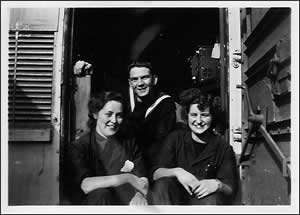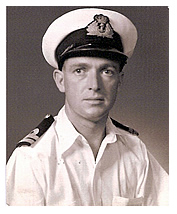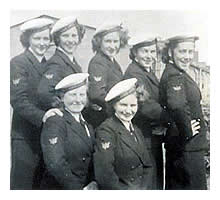The Royal Navy
Contents
Vikings, Romans and Norman invaders arrived by sea and settled in the country. Although each ruler had fleets of vessels, some more successful than others in repelling these invaders, it was not until Henry VIII created his Navy Royal, which by his death in 1547 numbered 58 vessels, that it was centrally organised. In 1546 a "Council of the Marine" which later became the "Navy Board" was established.
By 1660 when Charles II came to the throne, the fleet numbered 154 ships and became a permanent professional fighting force - The Royal Navy.
By 1805, there were almost 950 vessels and between 12,000 to 20,000 seamen were needed even in peacetime. At the height of the Napoleonic Wars 150,000 seaman were needed which resulted in the infamous Press Gangs.
The Royal Navy also carried out more peaceful tasks such as scientific and geographical surveying. Captain James Cook, among others, undertook long voyages which became longer as the health on board ships improved. Civilian scientists and artists would also be taken on these expeditions.
As well as the surface fleet and also part of the Naval Service, there are the Submarine Service which dates from 1901 and the Fleet Air Arm which was established in 1914.
The Royal Navy officially began to employ women as carers of servicemen, especially as nurses in 1883 although women would have been on board ship unofficially before this. The Women's Royal Naval Service (WRNS) was established in 1920.
The Royal Marines are the Royal Navy's amphibious infantry. In 1664 1200 soldiers were recruited for service in the Fleet. They were not only soldiers but also seamen.
The Royal Fleet Auxiliary is a civilian manned organisation owned and tasked by the Ministry of Defence. It exists to support the Royal Navy by supplying food, fuel and other stores allowing them to stay at sea for longer. It came into being in 1905.
Research guides are available from the National Archives ~ Royal Navy and Auxiliary Services.
Articles from Family Tree Forum's Online Magazine:
War Memorials
Prisoners of War
Records and Medals
Medals, Badges and Decorations
Prior to 1972 all RN personnel were given their service record when they discharged. For pension purposes the RN retained pay details.
Therefore the only information held on RN personnel who served prior to 1972 are their Service details (number, rank, name etc) and a list of dates and ships/shore bases. A Subject Access Requests (SAR) form needs to be completed in order to access records.
The following address should be used for all Royal Navy and Royal Marine Enquiries:
- DNCM
- Data Protection Cell
- Building 1/152
- PP65
- Victory View
- HMNB Portsmouth
- PO1 3LS
- Tel: 02392 727531-723114-726063
N.B. HMS Pembroke is a shore base not a ship. It was Chatham Naval Barracks and also home of the Coast guard Service. It is now part of the University of Greenwich.
Royal Navy Records can be applied for using the following contact address details.
Officers aged 60 or under:
- Naval Secretary (OMOBS)
- Room 169
- Victory Building
- HM Naval Base
- Portsmouth
- POL 3LS
Officers born before 1914 and Ratings enlisted before 1924:
Ratings enlisted after 1924:
- NPP Accounts 1, AFPAA
- Centurion Building
- Grange Road
- Gosport
- Hampshire
- PO13 9XA
World War 2 Crewlists
- HMS Prince of Wales
- HMS Repulse
- HMS Electra
- HMS Express
- HMS Tenedos
- HMAS Vampire
- SS Automedon
- HMS Cornwall
- HMS Dorsetshire
- HMS Encounter
- HMS Jupiter
- HMS Rapid
- HMS Saumarez
- HMS Stronghold
- HMS Thanet
- HMS Thracian
- HMS Peterel
- HMS Li-Wo
- HMS Dragonfly
- HMS Grasshopper
- HMS Hollyhock
- HMS Paladin
- HMS Porpoise
- HMS Quilliam
- HMS Stonehenge
- HMS Stratagem
- HMS Ulster
- HMS Verulam
- HMS Virago
- HMS Volage
- HM Tug Yin Ping
Back to Military and Maritime History
Back to Main Page
Back to General History


